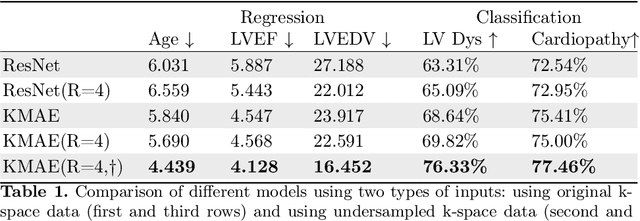Classification, Regression and Segmentation directly from k-Space in Cardiac MRI
Paper and Code
Jul 29, 2024



Cardiac Magnetic Resonance Imaging (CMR) is the gold standard for diagnosing cardiovascular diseases. Clinical diagnoses predominantly rely on magnitude-only Digital Imaging and Communications in Medicine (DICOM) images, omitting crucial phase information that might provide additional diagnostic benefits. In contrast, k-space is complex-valued and encompasses both magnitude and phase information, while humans cannot directly perceive. In this work, we propose KMAE, a Transformer-based model specifically designed to process k-space data directly, eliminating conventional intermediary conversion steps to the image domain. KMAE can handle critical cardiac disease classification, relevant phenotype regression, and cardiac morphology segmentation tasks. We utilize this model to investigate the potential of k-space-based diagnosis in cardiac MRI. Notably, this model achieves competitive classification and regression performance compared to image-domain methods e.g. Masked Autoencoders (MAEs) and delivers satisfactory segmentation performance with a myocardium dice score of 0.884. Last but not least, our model exhibits robust performance with consistent results even when the k-space is 8* undersampled. We encourage the MR community to explore the untapped potential of k-space and pursue end-to-end, automated diagnosis with reduced human intervention.
 Add to Chrome
Add to Chrome Add to Firefox
Add to Firefox Add to Edge
Add to Edge